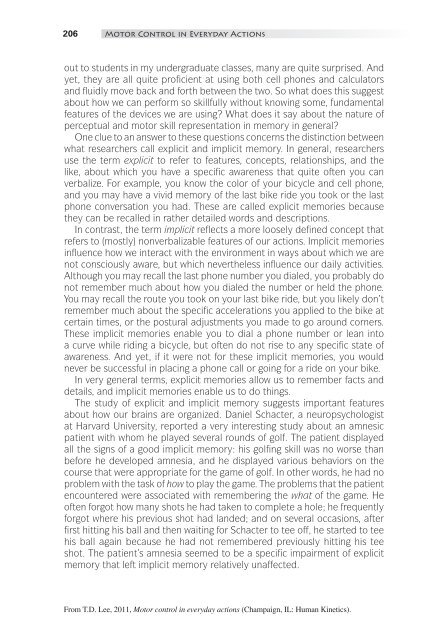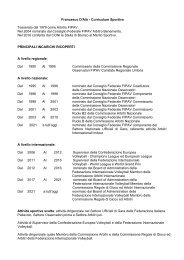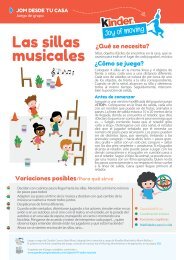Create successful ePaper yourself
Turn your PDF publications into a flip-book with our unique Google optimized e-Paper software.
206 Motor Control in Everyday Actions<br />
out to students in my undergraduate classes, many are quite surprised. And<br />
yet, they are all quite proficient at using both cell phones and calculators<br />
and fluidly move back and forth between the two. So what does this suggest<br />
about how we can perform so skillfully without knowing some, fundamental<br />
features of the devices we are using? What does it say about the nature of<br />
perceptual and motor skill representation in memory in general?<br />
One clue to an answer to these questions concerns the distinction between<br />
what researchers call explicit and implicit memory. In general, researchers<br />
use the term explicit to refer to features, concepts, relationships, and the<br />
like, about which you have a specific awareness that quite often you can<br />
verbalize. For example, you know the color of your bicycle and cell phone,<br />
and you may have a vivid memory of the last bike ride you took or the last<br />
phone conversation you had. <strong>The</strong>se are called explicit memories because<br />
they can be recalled in rather detailed words and descriptions.<br />
In contrast, the term implicit reflects a more loosely defined concept that<br />
refers to (mostly) nonverbalizable features of our actions. Implicit memories<br />
influence how we interact with the environment in ways about which we are<br />
not consciously aware, but which nevertheless influence our daily activities.<br />
Although you may recall the last phone number you dialed, you probably do<br />
not remember much about how you dialed the number or held the phone.<br />
You may recall the route you took on your last bike ride, but you likely don’t<br />
remember much about the specific accelerations you applied to the bike at<br />
certain times, or the postural adjustments you made to go around corners.<br />
<strong>The</strong>se implicit memories enable you to dial a phone number or lean into<br />
a curve while riding a bicycle, but often do not rise to any specific state of<br />
awareness. And yet, if it were not for these implicit memories, you would<br />
never be successful in placing a phone call or going for a ride on your bike.<br />
In very general terms, explicit memories allow us to remember facts and<br />
details, and implicit memories enable us to do things.<br />
<strong>The</strong> study of explicit and implicit memory suggests important features<br />
about how our brains are organized. Daniel Schacter, a neuropsychologist<br />
at Harvard University, reported a very interesting study about an amnesic<br />
patient with whom he played several rounds of golf. <strong>The</strong> patient displayed<br />
all the signs of a good implicit memory: his golfing skill was no worse than<br />
before he developed amnesia, and he displayed various behaviors on the<br />
course that were appropriate for the game of golf. In other words, he had no<br />
problem with the task of how to play the game. <strong>The</strong> problems that the patient<br />
encountered were associated with remembering the what of the game. He<br />
often forgot how many shots he had taken to complete a hole; he frequently<br />
forgot where his previous shot had landed; and on several occasions, after<br />
first hitting his ball and then waiting for Schacter to tee off, he started to tee<br />
his ball again because he had not remembered previously hitting his tee<br />
shot. <strong>The</strong> patient’s amnesia seemed to be a specific impairment of explicit<br />
memory that left implicit memory relatively unaffected.<br />
From T.D. Lee, 2011, Motor control in everyday actions (Champaign, IL: Human Kinetics).

















